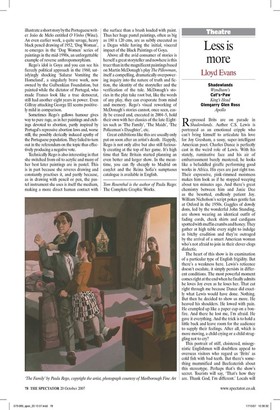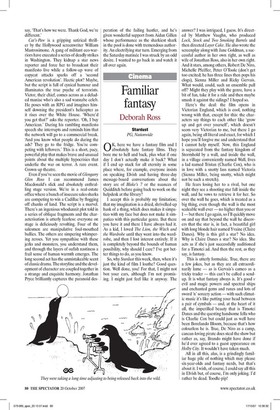Less is more
Lloyd Evans Shadowlands Wyndham's Cat's-Paw King's Head Glengarry Glen Ross Apollo Repressed Brits are on parade in Shadowlands. Author C.S. Lewis is portrayed as an emotional cripple who can't bring himself to articulate his love for Joy Gresham, a sassy, super-intelligent American poet. Charles Dance is perfectly cast in the weird role of Lewis. With his stately, ruminative face and his air of embarrassment barely mastered, he looks like a befuddled giraffe performing good works in Africa. His eyes are just right too. Their expressive, pink-rimmed moistness makes him look as if he stopped weeping about ten minutes ago. And there's great chemistry between him and Janie Dee as the besotted, endlessly patient Joy. William Nicholson's script pokes gentle fun at Oxford in the 1950s. Gaggles of dowdy dons, led by the wonderful John Standing, are shown wearing an identical outfit of fading cords, check shirts and cardigans spotted with muffin crumbs and honey. They gather at high table every night to indulge in bitchy erudition and they're outraged by the arrival of a smart American woman who's not afraid to join in their clever-clogs dialectic.
The heart of this show is its examination of a particular type of English frigidity. But there's a weakness here. Lewis's reticence doesn't escalate, it simply persists in different conditions. The most powerful moment comes right at the end when he finally admits he loves Joy even as he loses her. That cut right through me because Dance did exactly what Lewis would have done. Nothing. But then he decided to show us more. He heaved his shoulders. He lowed with pain. He crumpled up like a paper cup on a bonfire. And there he lost me, I'm afraid. He gave it everything. And the trick is to hold a little back and leave room for the audience to supply their feelings. After all, which is more moving, a child crying or a child struggling not to cry?
This portrait of stiff, cloistered, misogynistic Englishmen will doubtless appeal to overseas visitors who regard us 'Brits' as cold fish with bad teeth. But there's something mummified and Beefeaterish about this stereotype. Perhaps that's the show's secret. Tourists will say, 'That's how they are. Thank God, I'm different.' Locals will say, 'That's how we were. Thank God, we're different.'
Cat's-Paw is a gripping satirical thriller by the Hollywood screenwriter William Mastrosimone. A gang of militant eco-warriors have executed a series of deadly strikes in Washington. They kidnap a star news reporter and force her to broadcast their manifesto live while a follow-up wave of copycat attacks sparks off a 'second American revolution'. Hectic plot? Maybe, but the script is full of cynical humour and illuminates the true psyche of terrorists. Victor, their chief, comes across as a deluded maniac who's also a sad wannabe celeb. He poses with an RPG and imagines himself downing the president's helicopter as it rises over the White House. 'Where'd you get that?' asks the reporter. 'Oh, I buy American.' During his rambling manifesto speech she interrupts and reminds him that the network will go to a commercial break. 'And you know what people do during the ads? They go to the fridge. You're competing with leftovers.' This is a short, pacy, powerful play that makes brave and unusual points about the multiple hypocrisies that underlie the war on terror. A rare event. Grown-up theatre.
Even if you've seen the movie of Glengarry Glen Ross I can recommend James Macdonald's slick and absolutely enthralling stage version. We're in a real-estate office where a bunch of insecure sales sharks are competing to win a Cadillac by flogging off chunks of land. The script is a marvel. There's an ingenious whodunnit plot told in a series of oblique fragments and the characterisation is utterly fearless: everyone on stage is deliciously revolting. Four of the salesmen are manipulative foul-mouthed bullies. The others are simpering whimpering zeroes. Yet you sympathise with these jerks and monsters, you understand them, and through the layers of oafish nastiness a frail sense of human warmth emerges. The long second act has the unmistakeable scent of classic drama. The storyline and the development of character are coupled together in a strange and exquisite harmony. Jonathan Pryce brilliantly captures the paranoid desperation of the failing hustler, and he's given wonderful support from Aidan Gillen whose performance as the sharkiest shark in the pool is done with tremendous authority. An electrifying star turn. Emerging from the Saturday matinee I was struck by an odd desire. I wanted to go back in and watch it all over again.








































































 Previous page
Previous page